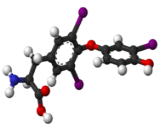Triiodothyronine (T3)
3,3',5-Triiodo-L-Thyronine; Liothyronine; Cytomel; Tertroxin

Under normal physiological conditions, T3 represents approximately 5 percent of the thyroid hormones in serum. Although present in lower concentration, T3 has a greater intrinsic metabolic activity, faster turnover and larger volume of distribution than circulating T4. Reports that thyrotoxicosis may be caused by abnormally high concentrations of T3 rather than T4 have reinforced the importance of T3 measurements. In addition, T3 determination is an important tool for monitoring hypothyroid patients receiving sodium liothyronine therapy. Unlike "T3 Uptake" tests, which estimate the saturation of thyroid hormone binding proteins, total T3 analysis measures circulating levels of triiodothyronine. Most reports indicate that T3 levels distinguish clearly between euthyroid and hyperthyroid subjects, but provide a less clear-cut separation between hypothyroid and euthyroid subjects. Numerous conditions unrelated to thyroid disease may cause abnormal T3 values.
Organism species: Pan-species (General)
| PRODUCT TYPE | CATALOG NO. | PRODUCT NAME | APPLICATIONS |
|---|---|---|---|
| Proteins | N/A | Recombinant Triiodothyronine (T3) | Antigenic Transformation Customized Service Offer |
| Antibodies | N/A | Monoclonal Antibody to Triiodothyronine (T3) | Monoclonal Antibody Customized Service Offer |
| N/A | Polyclonal Antibody to Triiodothyronine (T3) | Polyclonal Antibody Customized Service Offer | |
| Assay Kits | N/A | CLIA Kit for Triiodothyronine (T3) | CLIA Kit Customized Service Offer |
| N/A | ELISA Kit for Triiodothyronine (T3) | ELISA Kit Customized Service Offer |
